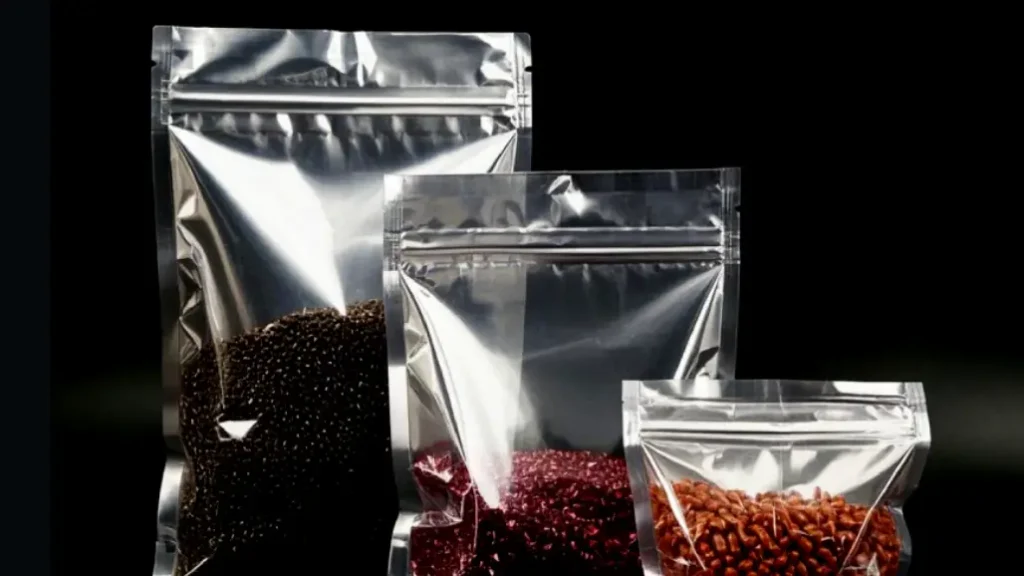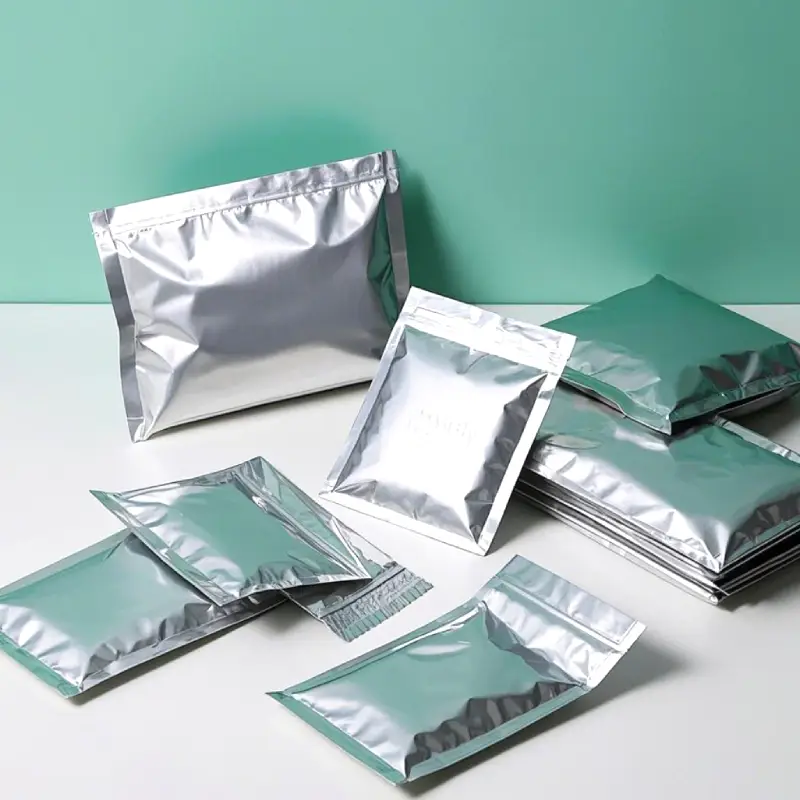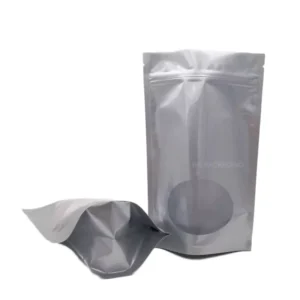Mylar bags are characterized by their distinctive metallic sheen, which is a result of a thin layer of aluminum or other metal coating applied to the polyester film. This metal layer provides excellent barrier properties, making Mylar bags highly effective at protecting their contents from moisture, oxygen, light, and punctures.
This guide will delve into the world of Mylar bags, exploring their unique properties, various applications, and how to choose the right Mylar bag for your specific needs.
What is a Mylar Bag
Mylar bags are specialized food storage bags made from a multi-layered material that includes a layer of aluminum foil. This unique composition gives them exceptional barrier properties against oxygen, moisture, and light. These bags are designed to create an airtight and light-proof environment, which helps to significantly extend the shelf life of the stored food.
The aluminum layer within Mylar bags reflects light and acts as an effective barrier against oxygen and moisture, preventing spoilage and preserving the freshness and flavor of the stored items. This makes them ideal for long-term food storage, emergency preparedness, and preserving the quality of sensitive foods.
What Are Mylar Bags Made Of
Mylar bags are primarily composed of a multi-layered material, with the key component being a thin layer of aluminum foil sandwiched between other layers.
- Polyester Film: The base material is typically a strong, clear polyester film. This film provides structural support and a barrier against minor punctures.
- Aluminum Foil: The critical element is the aluminum foil layer. This layer is incredibly thin yet highly effective at blocking oxygen, moisture, and light. Aluminum’s reflective properties minimize the penetration of light, which can degrade the quality of stored food.
- Other Layers: Depending on the specific type of Mylar bag, there may be additional layers such as nylon or other polymers. These layers enhance the bag’s strength, flexibility, and overall barrier properties.
This combination of materials creates a robust and effective barrier that helps to preserve the freshness, flavor, and nutritional value of the stored food for extended periods.
What Are Mylar Bags Used For

Mylar bags have a wide range of applications due to their excellent barrier properties:
Food Storage:
- Long-Term Preservation: Mylar bags are widely used for long-term food storage, such as emergency preparedness, camping, and hiking. They help preserve dried foods like grains, beans, rice, flour, and powdered milk for extended periods.
- Freshness: Mylar bags can also be used to preserve the freshness of coffee, tea, spices, nuts, and dried fruits.
Other Uses:
Document Preservation: Mylar bags can protect important documents like photos, certificates, and legal papers from moisture, dust, and damage.
Electronics Protection: They can be used to protect sensitive electronics from moisture and dust during storage or transportation.
Medical and Pharmaceutical Applications: Mylar bags are used to package and store medications, medical supplies, and other sensitive materials.
This is not an exhaustive list, as Mylar bags have diverse applications across various industries and for personal use.
Benefits of Mylar Bags for Food Products
Mylar bags offer several benefits for food products, making them a popular choice for both home storage and commercial applications:
- Extended Shelf Life: Mylar bags create an airtight barrier that protects food from oxygen, moisture, and light. This significantly extends the shelf life of many food items, reducing spoilage and waste.
- Preservation of Nutrients: By minimizing exposure to oxygen and light, Mylar bags help to preserve the nutritional value of food. Vitamins, minerals, and antioxidants are better retained, ensuring that your food remains as healthy as possible for longer.
- Pest Protection: The airtight seal of Mylar bags prevents insects and rodents from accessing and contaminating your food. This is particularly important for long-term storage.
- Versatility: Mylar bags can be used to store a wide variety of food items, including grains, beans, nuts, seeds, dried fruits, coffee, and even freeze-dried meals.
- Space Efficiency: Mylar bags are lightweight and compact, making them easy to store and transport. They can help to maximize storage space in your pantry, refrigerator, or emergency preparedness kit.
- Cost-Effectiveness: While the initial investment in Mylar bags may be slightly higher than traditional storage methods, the long-term savings from reduced food waste and extended shelf life can make them a cost-effective solution.
By utilizing the protective properties of Mylar bags, you can ensure that your food stays fresh, nutritious, and safe for consumption for an extended period.
How Long Does Food Last in Mylar Bags
The shelf life of food stored in Mylar bags can vary greatly depending on several factors:
- Type of Food:
- Low-moisture foods like grains, beans, and dried fruits generally have the longest shelf life.
- High-fat foods like nuts and seeds may have shorter shelf lives due to potential rancidity.
- Storage Conditions:
- Cool, dark, and dry environments significantly extend shelf life.
- Fluctuating temperatures and humidity can accelerate spoilage.
- Use of Oxygen Absorbers:
- Oxygen absorbers significantly reduce the amount of oxygen in the bag, further inhibiting microbial growth and oxidation. This can dramatically increase shelf life.
General Guidelines:
- With Oxygen Absorbers: Many dry foods can last for 20-30 years or more when properly stored in Mylar bags with oxygen absorbers.
- Without Oxygen Absorbers: Shelf life is significantly reduced, typically to a few months or years, depending on the food.
Important Note: These are general estimates. It’s always best to use a “use-by” or “best-by” date as a general guideline and to inspect food regularly for signs of spoilage (mold, discoloration, off-odors).
Related:
- How Long Will Coffee Last in Mylar Bags?
- How Long Does Oatmeal Last in Mylar Bags?
- How Long Does Rice Last in Mylar Bags?
- How Long Does Pasta Last in Mylar Bags
- How Long Will Sugar Last in Mylar Bags
- How Long Will Flour Last in Mylar Bags?
Are Mylar Bags Food Safe
Yes, Mylar bags are generally considered food-safe when used correctly. Here’s why:
- Material: Mylar is a type of polyester film that is approved for food contact by the FDA. It’s commonly used in food packaging due to its strong barrier properties against moisture, oxygen, and light.
- Safety: The metalized layer in Mylar bags does not directly contact the food, preventing any potential leaching of metals.
Important Considerations:
- Food-Grade: Always ensure you are using Mylar bags specifically labeled as “food-grade.”
- Storage: Proper storage is crucial. Keep Mylar bags in a cool, dark, and dry place to maintain food quality.
- Oxygen Absorbers: For long-term storage, using oxygen absorbers with Mylar bags can significantly extend the shelf life of your food.
By following these guidelines, you can safely use Mylar bags to store a variety of dry foods and enjoy their benefits for extended food preservation.
What Can You Store in Mylar Bags

What can be stored in mylar bags? Mylar bags are incredibly versatile and can be used to store a wide range of items.
Here are some of the most common mylar bag uses:
Food Storage:
Dry Goods:
- Grains: Rice, wheat, oats, barley, quinoa
- Beans: Lentils, kidney beans, black beans, chickpeas
- Flour: All-purpose, whole wheat, bread flour
- Sugar: White sugar, brown sugar, powdered sugar
- Pasta: Dried pasta, noodles
- Seeds: Chia seeds, flax seeds, sunflower seeds
- Nuts: Almonds, walnuts, pecans (best for short-term storage)
- Dried Fruits: Raisins, cranberries, apricots
Other Foods:
- Coffee beans (whole or ground)
- Tea leaves
- Spices
- Powdered milk
- Dried herbs
- Dehydrated vegetables
- Freeze-dried foods
Non-Food Items:
- Important Documents: Birth certificates, passports, social security cards, insurance documents
- Valuables: Jewelry, small electronics, keepsakes
- Seeds: Garden seeds for long-term storage
Key Considerations:
- Moisture Content: Mylar bags are most effective for storing dry, low-moisture foods.
- Oxygen Sensitivity: Foods high in fat or oil may go rancid more quickly, even in Mylar bags.
- Storage Conditions: Proper storage in a cool, dark, and dry location is essential for optimal shelf life.
By understanding the versatility of Mylar bags, you can effectively utilize them for preserving food, protecting valuable documents, and organizing various household items.
What Not to Store in Mylar Bags
Mylar bags are excellent for storing many dry goods, but they are not suitable for everything. Here’s a list of items that should not be stored in Mylar bags:
Foods with High Moisture Content:
- Fresh fruits and vegetables
- Meats (fresh or cured)
- Dairy products (milk, cheese, yogurt)
- Canned goods
- Fermented foods (sauerkraut, kimchi)
Foods with High Fat Content:
- Oils
- Nuts (long-term storage)
- Fatty meats
- Chocolate
Liquids:
- Water
- Juices
- Sauces
Sharp Objects:
- Knives
- Scissors
- Metal utensils
Items That Emit Gases:
- Batteries
- Certain chemicals
Reasons for Avoidance:
- Moisture Build-up: High-moisture foods can cause mold growth within the bag, potentially compromising the food and the bag itself.
- Fat Rancidity: Foods high in fat can become rancid more quickly in an oxygen-reduced environment.
- Leakage: Liquids can leak and damage the bag, potentially contaminating other stored items.
- Punctures: Sharp objects can puncture the bag, compromising its integrity and allowing air and moisture to enter.
- Gas Buildup: Some items may release gases that can cause the bag to expand or rupture.
Important Note: Always prioritize safety and use appropriate storage methods for different types of items.
Are Mylar Bags BPA Free
Yes, Mylar bags themselves are typically BPA-free.
Here’s why:
- Material: Mylar is primarily made of polyester (polyethylene terephthalate – PET), which does not contain BPA.
- BPA in Plastics: BPA is a chemical compound used in the production of some plastics, particularly polycarbonate.
Important Note: While the Mylar bag itself is usually BPA-free, it’s crucial to ensure that any inks or coatings used on the bag are also BPA-free. Look for specific labeling that states the bag is BPA-free for food contact.
Noted: BPA stands for Bisphenol A. It’s an industrial chemical that has been used to make certain plastics and resins since the 1950s.
Is Mylar the Same as Aluminum Foil?
No, Mylar and aluminum foil are not the same. Mylar is a brand name for a type of polyester film, while aluminum foil is, as the name suggests, a thin sheet of aluminum metal.
Is Mylar Better for Child Resistance?
Mylar bags can be designed with child-resistant features, but it depends on the specific design and closure mechanism. Some Mylar bags incorporate features like difficult-to-open zippers, tamper-evident seals, and child-resistant closures to make it harder for young children to access the contents.
However, it’s important to note that no packaging method is completely childproof. Children are resourceful, and even the most sophisticated child-resistant packaging can be opened by determined youngsters.
Are Mylar Bags Toxic?
Mylar bags themselves are generally considered non-toxic when used correctly. They are made from food-grade materials and do not leach harmful chemicals into food. However, it’s important to use Mylar bags specifically designed for food storage and to follow proper storage guidelines.
Are Mylar Bags Recyclable?
Mylar bags are not typically recyclable through standard curbside programs due to their multi-layer construction (plastic film and metalized coating). However, some specialized recycling facilities may accept them. Check with your local waste management provider for specific guidelines.
Are Mylar Bags Anti Static?
Mylar bags can have some anti-static properties due to the metalized layer, which can help to shield the contents from static electricity. However, they are not specifically designed as anti-static bags for electronics and may not provide the same level of protection as specialized anti-static bags.
Are Mylar Bags X Ray Proof?
Mylar bags are not completely x-ray proof. While the metalized layer can attenuate some x-rays, it will not completely block them. The extent of attenuation depends on the thickness and density of the metalized layer, as well as the energy of the x-rays.
Conclusion
Mylar bags have become an indispensable tool for preserving food freshness and extending shelf life. Their exceptional barrier properties against oxygen, moisture, and light make them ideal for safeguarding a wide range of products, from coffee and spices to dried fruits and emergency food supplies. By incorporating Mylar bags into your storage practices, you can enjoy fresher, tastier food for longer while minimizing waste.
Ready to experience the benefits of Mylar bags for your business? BN Pack offers a wide range of high-quality wholesale Mylar bags in various sizes and thicknesses to suit your specific needs. Our Mylar bags are ideal for preserving coffee, spices, dried fruits, and much more. Visit our website today to explore our selection and discover the perfect packaging solution for your products.
By choosing BN Pack for your Mylar bag needs, you can ensure that your products are stored safely and effectively, maintaining their quality and freshness for your customers.

